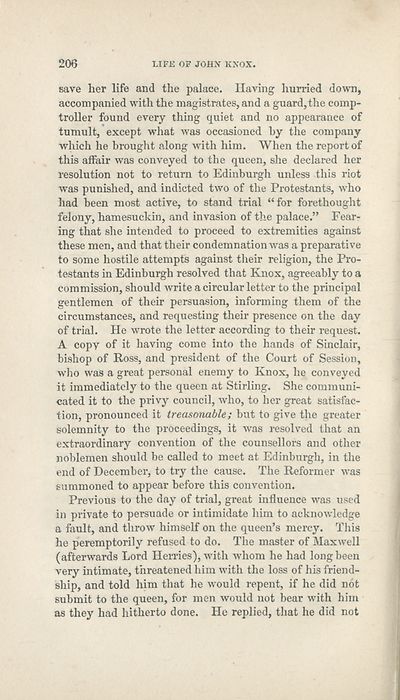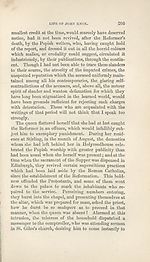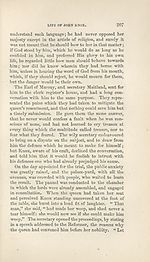Download files
Complete book:
Individual page:
Thumbnail gallery: Grid view | List view

206
E OF JOHN KNOX.
save her life and the palace. Having hurried down,
accompanied with the magistrates, and a guard, the comp¬
troller found every thing quiet and no appearance of
tumult, except what was occasioned by the company
which he brought along with him. When the report of
this affair was conveyed to the queen, she declared her
resolution not to return to Edinburgh unless this riot
was punished, and indicted two of the Protestants, who
had been most active, to stand trial “for forethought
felony, hamesuckin, and invasion of the palace.” Fear¬
ing that she intended to proceed to extremities against
these men, and that their condemnation was a preparative
to some hostile attempts against their religion, the Pro¬
testants in Edinburgh resolved that Knox, agreeably to a
commission, should write a circular letter to the principal
gentlemen of their persuasion, informing them of the
circumstances, and requesting their presence on the day
of trial. He wrote the letter according to their request.
A copy of it having come into the hands of Sinclair,
bishop of Ross, and president of the Court of Session,
who was a great personal enemy to Knox, he conveyed
it immediately to the queen at Stirling. She communi¬
cated it to the privy council, who, to her great satisfac¬
tion, pronounced it treasonable; but to give the greater
solemnity to the proceedings, it was resolved that an
extraordinary convention of the counsellors and other
noblemen should be called to meet at Edinburgh, in the
end of December, to try the cause. The Reformer was
summoned to appear before this convention.
Previous to the day of trial, great influence was used
in private to persuade or intimidate him to acknowledge
a fault, and throw himself on the queen’s mercy. This
he peremptorily refused to do. The master of Maxwell
(afterwards Lord Hemes), with whom he had long been
very intimate, threatened him with the loss of his friend¬
ship, and told him that he would repent, if he did not
submit to the queen, for men would not bear with him
as they had hitherto done. He replied, that he did not
E OF JOHN KNOX.
save her life and the palace. Having hurried down,
accompanied with the magistrates, and a guard, the comp¬
troller found every thing quiet and no appearance of
tumult, except what was occasioned by the company
which he brought along with him. When the report of
this affair was conveyed to the queen, she declared her
resolution not to return to Edinburgh unless this riot
was punished, and indicted two of the Protestants, who
had been most active, to stand trial “for forethought
felony, hamesuckin, and invasion of the palace.” Fear¬
ing that she intended to proceed to extremities against
these men, and that their condemnation was a preparative
to some hostile attempts against their religion, the Pro¬
testants in Edinburgh resolved that Knox, agreeably to a
commission, should write a circular letter to the principal
gentlemen of their persuasion, informing them of the
circumstances, and requesting their presence on the day
of trial. He wrote the letter according to their request.
A copy of it having come into the hands of Sinclair,
bishop of Ross, and president of the Court of Session,
who was a great personal enemy to Knox, he conveyed
it immediately to the queen at Stirling. She communi¬
cated it to the privy council, who, to her great satisfac¬
tion, pronounced it treasonable; but to give the greater
solemnity to the proceedings, it was resolved that an
extraordinary convention of the counsellors and other
noblemen should be called to meet at Edinburgh, in the
end of December, to try the cause. The Reformer was
summoned to appear before this convention.
Previous to the day of trial, great influence was used
in private to persuade or intimidate him to acknowledge
a fault, and throw himself on the queen’s mercy. This
he peremptorily refused to do. The master of Maxwell
(afterwards Lord Hemes), with whom he had long been
very intimate, threatened him with the loss of his friend¬
ship, and told him that he would repent, if he did not
submit to the queen, for men would not bear with him
as they had hitherto done. He replied, that he did not
Set display mode to:
![]() Universal Viewer |
Universal Viewer | ![]() Mirador |
Large image | Transcription
Mirador |
Large image | Transcription
| Antiquarian books of Scotland > Scotland/Scots > Life of John Knox ; and, The life of Alexander Henderson > (224) |
|---|
| Permanent URL | https://digital.nls.uk/131834992 |
|---|
| Description | Thousands of printed books from the Antiquarian Books of Scotland collection which dates from 1641 to the 1980s. The collection consists of 14,800 books which were published in Scotland or have a Scottish connection, e.g. through the author, printer or owner. Subjects covered include sport, education, diseases, adventure, occupations, Jacobites, politics and religion. Among the 29 languages represented are English, Gaelic, Italian, French, Russian and Swedish. |
|---|

